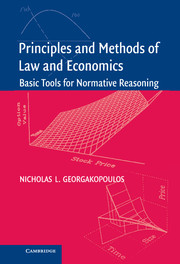Book contents
- Frontmatter
- Contents
- Preface
- INTRODUCTION: INNOVATION IN LEGAL THINKING
- PART 1 PRINCIPLES
- 1 FROM FORMAL LOGIC TO NORMATIVE REASONING
- 2 SOCIAL WELFARE VERSUS MORAL PHILOSOPHY
- 3 FROM POLITICAL PHILOSOPHY TO GAME THEORY
- 4 THE IMPORTANCE OF DISTRIBUTION OF WEALTH
- 5 COASE AND LAW'S IRRELEVANCE
- 6 MORE FAILURES OF COASEAN IRRELEVANCE
- PART 2 METHODS
- APPENDIX A MEINHARD V. SALMON 249 N.Y. 458 (1928)
- APPENDIX B GLOSSARY
- APPENDIX C MATHEMATICA NOTEBOOKS
- Index
4 - THE IMPORTANCE OF DISTRIBUTION OF WEALTH
Published online by Cambridge University Press: 24 July 2009
- Frontmatter
- Contents
- Preface
- INTRODUCTION: INNOVATION IN LEGAL THINKING
- PART 1 PRINCIPLES
- 1 FROM FORMAL LOGIC TO NORMATIVE REASONING
- 2 SOCIAL WELFARE VERSUS MORAL PHILOSOPHY
- 3 FROM POLITICAL PHILOSOPHY TO GAME THEORY
- 4 THE IMPORTANCE OF DISTRIBUTION OF WEALTH
- 5 COASE AND LAW'S IRRELEVANCE
- 6 MORE FAILURES OF COASEAN IRRELEVANCE
- PART 2 METHODS
- APPENDIX A MEINHARD V. SALMON 249 N.Y. 458 (1928)
- APPENDIX B GLOSSARY
- APPENDIX C MATHEMATICA NOTEBOOKS
- Index
Summary
An egalitarian intuition is an almost universal human trait. The desire of some jurists to promote equality leads them to reject law and economics because it appears to ignore egalitarian concerns. This chapter explains how scholars using law and economics tend to treat equal distribution of wealth, why they appear to ignore the value of redistribution, and that scholars using law and economics may actually share their critics' desire for redistribution. The teachings of law and economics, however, indicate that redistribution is often best performed by the tax system. Unless this presumption is rejected, legal interpretation should not sacrifice gains in exchange for redistribution.
The tension between redistribution and economic analysis of law can be illustrated with Meinhard v. Salmon. Salmon received a lucrative offer from Gerry, a business acquaintance. The offer could have expanded Salmon's business. Unbeknownst to Gerry, Salmon's business, which was the reason for their acquaintance, had a secret partner, Meinhard. If Gerry knew that Salmon operated in two capacities, as an individual and as a member of a partnership, then Gerry may have specified which of the two he selected as the recipient of his offer. Meinhard, the invisible partner, claimed the offer should be treated as made to the partnership. The litigation that Meinhard started eventually reached the highest court of the jurisdiction and the famous American judge, Benjamin Cardozo, and his colleague Andrews, who is almost equally famous for his vocal dissenting opinions. Previously established law did not answer the question directly.
- Type
- Chapter
- Information
- Principles and Methods of Law and EconomicsEnhancing Normative Analysis, pp. 72 - 94Publisher: Cambridge University PressPrint publication year: 2005



